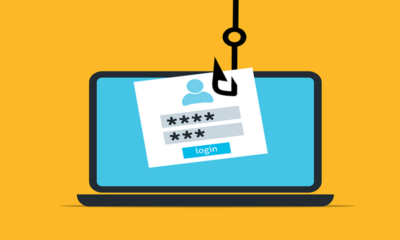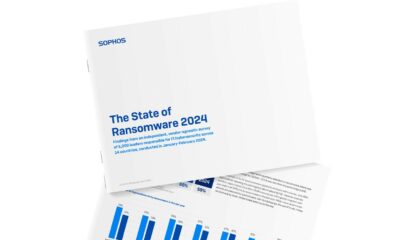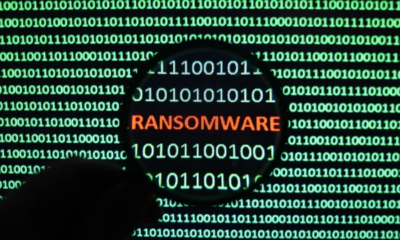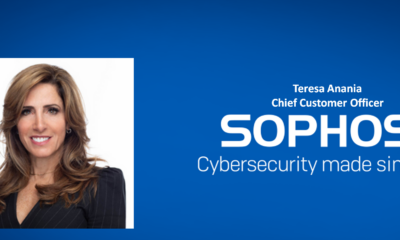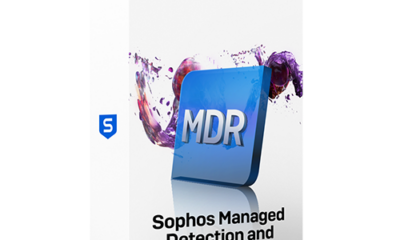GRTech
Sophos discovers SMS phishing scam that pretends to be Apple “chatbot”
BY Sandra Ani
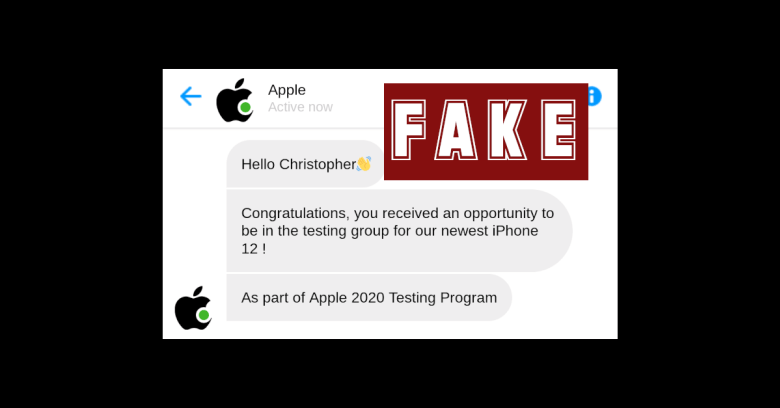

If you think SMSes are dead, you need to have a rethink. In fact, SMS is still of big interest to businesses and cybercriminals know about this.
If you consider this report coming from Naked Security, you will understand they are still widely used because of their simplicity and convenience.
Indeed, as a general-purpose short message service – which is literally what the letters SMS stand for – it’s hard to beat, because any phone can receive text messages, from the fanciest smartphone to the cheapest pre-paid mobile.
If all you need to transmit is a 6-digit logon code or a “pizza driver now 2 minutes away” notification, SMSes still make excellent business sense.
Sadly, and as noted by Naked Security, however, what works for legitimate businesses almost always works for cybercriminals too, so there are plenty of crooks still using SMSes for phishing – an attack that’s wryly known as smishing.
You can see why SMSes work for crooks. Start a
With just 160 characters per message, it’s easy for them to avoid the grammatical and stylistic blunders that they often make when they’re forced to produce longer-format email messages in a language they don’t speak well.
Better yet, business SMSes generally use URL shorteners to save space, giving the criminals an excuse to do the same.
URL shorteners convert lengthy but meaningful web addresses such as https://brandname.example.com/pizza-order.html?lang=en-US into a compressed but cryptic format such as https://xx.test/ABXt that frees up characters for the rest of the SMS, but disguises where the link is going to end up.
Hovering over a shortened link doesn’t help because the link denotes the actual website you’ll visit.
The link shortening site uses the characters after the website name (ABXt in our made-up example above) as an index to look up the real destination and then sends an HTTP 301 Moved Permanently reply to tell your browser where to go next. You need to click through to the shortening site first before you find out where you are supposed to end up.
The SMS system, of course, doesn’t know anything about URLs or even about the internet – but it doesn’t need to.
Your phone’s operating system will happily recognise when the text in an SMS looks like a URL and automatically make it clickable for you.
So, when the crooks use shortened URLs in their smishing scams, they don’t look unusual or out of place, even though the crooks are doing it specifically to be treacherous and not to save space.
As a result, text messages that contain one short, clipped sentence that wouldn’t look right in an email, and that contain deliberately disguised links that we might be suspicious of anywhere else…
…look surprisingly natural when they show up in an SMS.
Like this one we received earlier this week. (We’re not called Christopher and we don’t live in Derry, which is in Northern Ireland. The incomplete address given is a genuine suburban street, presumably plucked from a map to make it seem realistic.)

Source: Naked Security
Dear Christopher, we have your packet in queue. Address: Londonderry, Ballynagard crescent
http COLON SLASH SLASH xxxxxxxx DOT com SLASH zzzzzzz
The message is meant to look as though it was sent to the wrong number, so the crooks are relying on you being intrigued enough to click through, whereupon they use some sneaky “reverse authentication” psychology to lure you in further.
The scam first shows you some cheery messages from a fake Apple chatbot to tell you why you – actually, to tell you why Christopher – had enough luck to be chosen to take part in an iPhone 12 trial, and then it invites you – actually, it invites Christopher – to join in:

Source: Naked Security
Here, the link looks genuine, but the blue characters are simply the clickable text of the link, not the URL that is the destination of the link.
At this point, you’re no longer in the SMS messaging app but have clicked through into your browser, so you can see where the fake link leads if you hover your mouse over it. (On a phone, tap-and-hold on the link until the destination pops up.)
But if you aren’t cautious, you might wonder whether “Christopher” really was part of some Apple pre-release group.
What if you claim Christopher’s promo for yourself?
In fact, what’s stopping you from simply clicking through as if you were Christopher and finding out for yourself?
Well, one thing is stopping you, namely that you have to “prove” yourself by by giving your full name and address – except, of course, that the crooks helpfully leaked that information to you in the original text, making the “test” easy to pass.
You can guess what happens next:

Source: Naked Security
In case you’re wondering, the name-and-address answers above in part 3/5 don’t matter a jot. We tried clicking numerous different combinations and, unsurprisingly, the crooks let us through anyway. The questions are there just to provide a plausible connection back to the SMS that was meant for “Christopher” but that reached you instead. It’s as though the criminals are trying to “authenticate” themselves to you, rather than the other way around.
As you see above, if you do click through the questions then you end up on a scam site (there were several variations, all similar – we tried the smish repeatedly) where you find there’s a courier delivery charge for the “free” phone, typically between £1 and £2.
Then you end up on a credit card payment form that’s hosted on what looks like a “special offers” website with a believable enough name, and with an HTTPS security padlock if you take the time to look.
Of course, if you try to pay your modest delivery charge, you are simply handing over your personal data to the crooks, including your full card number and security code:

Source: Naked Security
How bad is this?
Is this really a big deal, given that most of us would back ourselves to spot this as a scam right from the start?
Yes, it is.
Many of us have friends or family – perhaps even an at-risk relative who has been scammed before – who wouldn’t be so sure, and for whom the reverse authentication trick of asking for “Christopher’s” name and address might be convincing enough to draw them in further.
And friends don’t let friends get scammed, so if ever you get asked by someone who relies on you for cybersecurity help, “So what would happen if I clicked through?”…
…you can show them the short video above and let them see how these scams play out – without having to click through yourself.
What to do?
The article recommends that:
1. There is no free phone
And if there were a free phone, you wouldn’t have to hand over your credit card details and pay £1 for it. You’re not getting something for nothing – you’re handing over something for nothing, and the crooks will use it against you. If you’re in any doubt, don’t give it out.
2. Keep your eyes open for clues
The crooks have made numerous spelling and visual blunders in this scam. We’re not going to help them by listing them all like your English Language teacher would have done at school, but there are quite a few things that just don’t look right, even if you assume that there really is a free phone at the end of this. You might not always notice every clue, but always give yourself the time to look and therefore the best chance to catch out the crooks.
3. Look at the link before you click
If anything looks wrong, it IS wrong. Even if the crooks don’t make any spelling or grammatical mistakes they almost always need to lead you to a website that they control.
Often, that means a bogus link that you ought to spot if you take your time. Never let yourself get rushed into clicking through, no matter how much the crooks play on your fear of missing out.
4. Consider a web filter
Network web filtering on your business network isn’t about surveillance, it’s about online safety. This helps you keep the bad stuff out, and helps your users keep the good stuff in, such as passwords and payment card numbers. Setting up a corporate VPN (virtual private network) means that users at home can browse securely back through the office network and enjoy the same protection that’t they’d have on the LAN at work.
[NB: The article was first published for Sophos by Naked Security]
GRTech
Nnaemeka Ani Admonishes African Techies to Build for Legacy
“Let’s stop building for hype. Let’s start building for legacy.”


In a rousing declaration that is electrifying minds across the continent, Hon. Nnaemeka Ani, Special Adviser on ICT to Enugu State Governor Peter Mbah, has called for a homegrown digital revolution under the banner “Africa Will Rise: By Code, By Courage, By Us.”
The message, part challenge, part philosophical—seeks to galvanize African innovators to move beyond buzzwords and build technology with impact and legacy in mind.
“Let’s stop building for hype. Let’s start building for legacy,” Ani urged while speaking to ICT journalists over the weekend. “Let’s stop waiting for someone else. Let’s start creating the future—on our own terms.”
At the heart of Ani’s vision is a shift from tech consumerism to tech authorship. With innovation hubs sprouting across cities like Enugu, Lagos, Kigali, Jo’Burg, and Nairobi, and a growing community of developers, engineers, and entrepreneurs determined to solve Africa’s unique challenges, the movement is already taking shape.
Ani emphasized that Africa’s future lies not in flashy apps or international admiration but in persistent, intentional solutions that uplift communities—solutions that digitize public services, bridge rural-urban divides, empower women and youth, and build resilience in food and climate systems.
“We have the talent,” he said. “Now it’s time to harness it—to stop building for likes, and start building for lasting impact.”
With support from leaders like Ani and rising momentum in Africa’s tech corridors, it seems that a new chapter is being written—one line of code at a time.
Reviews
Book Review of The Village Priest by Remmy Nweke @NDSF 2025
By ‘Gbenga Sesan, Executive Director, Paradigm Initiative


On Thursday, June 19, 2025, I had the honour of reviewing The Village Priest by Remmy Nweke—a powerful narrative that weaves together history, tradition, resistance, reconciliation, and innovation, set within the verdant hills of Ilimefo, a village nestled in the heart of Igboland, where “the air was alive with the whispers of ancestors and the rhythms of tradition.”
At the heart of this story is Ogboo AniEze, the revered traditional chief priest of Ilimefo. His life is “dedicated to the preservation and celebration of Ilimefo’s customs and traditions.” The book opens with a clear and symbolic statement of context: “The village and its people, their traditional practices and strong cultural heritage at the crossroads!” This sets the tone for what is not just a fictional tale but a textured documentation of a people’s encounter with time and change.
Ilimefo is introduced to us as a place where “tradition was woven into the very fabric of life,” with festivals like Onwu-ano linked to agricultural cycles and the rhythms of the earth. The rituals, we learn, are not arbitrary. They are “intricately woven” into the identity and continuity of the people. Ogboo AniEze does not merely perform these rituals—he embodies them. “His eyes, clouded with the wisdom of age, seemed to hold the secrets of the past,” and his voice “could calm the most troubled of minds.”
We are told, in great detail, about the structure and discipline of his priesthood: lieutenants from six villages, each with precise roles. Some “raise a cup of water,” others “kill the offerings,” while others “prepare the offerings when cooked.” The sacred rhythm of Ilimefo is grounded in Igbo cosmology, with rituals observed “every Eke market day,” that is, every five days.
As a young boy, Ogboo AniEze apprenticed under his grandfather, “a renowned traditional priest.” His education was both spiritual and practical—“the sacred languages,” “traditional healing practices,” and also “farming, hunting, and craftsmanship.” Through sacred journeys to forests, rivers, and mountains, “a deep connection to the natural world and the spirits that inhabited it” was forged.
One of the cultural pillars explored in the book is masquerading—a practice that carries symbolic, spiritual, and social weight. The masks “represent ancestral spirits, mythological creatures, and symbolic figures.” During festivals, “masked performers danced and sang,” their performances serving both as entertainment and as “social commentary, addressing issues and concerns.”
Yet, as the wind of change began to blow, Ogboo AniEze “encountered modernizing influences such as Christianity and western education,” which “challenged his traditionalist views.” Criticism followed—some said his values were “outdated and restrictive,” accusing him of “lack of adaptability,” and being “disconnected from the modern reality.” But for Ogboo, his visions, his ancestral worship, and his connection to “sacred journeys” remained a steadfast compass.
The villagers, meanwhile, expected him to do more than perform rituals. They expected him to provide “spiritual guidance, interpreting the will of the gods and ancestors,” “offering counseling and mediation,” and even guidance on agriculture and healing. He became “a respected and beloved figure,” not because he resisted change, but because he “found creative ways to balance the two.”
But change came fast and hard with the arrival of GSM—“a strange and mysterious piece of technology.” Introduced by “a group of outsiders, including a Catholic priest, Fada Ekie,” mobile phones arrived in Ilimefo, bringing with them “a stir among the villagers.” At first, the villagers were “fascinated and intimidated,” unsure how to engage with “small and sleek” devices that brought “the hum of signals and the chatter of voices.”
This is where the book truly grapples with its core tension. For Ogboo AniEze, GSM was both opportunity and threat. It “distracted them from their traditional practices” and “threatened to erode the cultural heritage of Ilimefo.” And when his own son, Okorie, embraced the technology, seeing “economic prospects” and “new possibilities,” the crisis became deeply personal.
Ogboo AniEze was “torn between his love and pride for his son and his concern for the impact of the technology.” He feared GSM would “lead to the erosion of the village’s cultural heritage” and cause a “brain drain” as young people “leave the village in search of better opportunities.” He also feared “isolation from the community” and began to “question his own faith and the traditions he had sworn to uphold.”
This led to the turning point. In the hills, he embarked on “dry fasting for a whole four market days.” He returned from that solitary experience with “a new found understanding.” He saw that GSM, though disruptive, “also offered opportunities for growth, development, and connection with the wider world.” He reconciled with Okorie. He apologized to the villagers. He even welcomed the presence of Fada Ekie, the Catholic priest.
What follows is a new era of harmony, where “tradition and modernity coexisted in balance.” Ogboo AniEze began to use mobile phones to “coordinate traditional ceremonies and rituals,” to “document the village’s traditions,” and to “connect with villagers in the diaspora.” The GSM technology, initially feared, became “a powerful tool for preserving the village’s cultural heritage.”
Through collaboration with Fada Ekie, Ilimefo experiences what the book calls a “fusion of traditions”—traditional prayers “incorporated into Catholic ceremonies,” Catholic teachings “infused with indigenous spiritual practices,” and “ancestor veneration blended with the tradition of honoring saints.” The result is “a new spiritual identity,” where “community healing practices” are made stronger through cooperation, and where “interfaith collaboration” becomes a working model for other communities.
Even as GSM introduced new social behaviours—such as Facebook Live streaming of village festivals, or parishioners charging phones during Mass—there is no ridicule or mockery. Instead, Remmy Nweke allows the reader to witness cultural evolution with empathy and respect.
In the Epilogue, we find Ogboo AniEze and Fada Ekie standing together, “looking out at the vibrant scene.” Their story is one of convergence, of two paths that once seemed to diverge, now blending into one shared future. As “the village erupted in joyous cheers,” they “clasped hands,” symbolizing a unity forged through respect, dialogue, and vision.
Let me end where the book ends—on a note of blessing and pride. At the close of the novel, as the village celebrates this new era, Ogboo AniEze declares it “Oyibo Day” and rolls out the drums—not to erase his past, but to embrace a future that includes both Okorie’s device and his own divination, both digital and divine.
The Village Priest is a careful work of cultural documentation, offering not just a story but a chronicle—a record of transition that many rural and even urban African communities continue to live through. It teaches us, without preaching, that true innovation is not in abandoning our roots, but in strengthening them with new tools.
Thank you.
GRTech
Refurbished tech: Making a smart choice for a greener future
By Qrent Managing Executive Kwirirai Rukowo


Consumers and businesses are constantly striving for the latest and greatest technology. However, behind the pursuit of cutting-edge devices lies a significant environmental toll – one that often goes unnoticed. The production of new technology requires vast amounts of natural resources, energy, and labour, contributing to both environmental degradation and significant carbon emissions.
With concerns about sustainability at an all-time high, companies are now looking for ways to reduce their environmental impact without compromising on performance or innovation. Refurbished tech, such as the solutions offered by Qrent, presents an effective, affordable, and eco-friendly alternative.
The refurbished computers and laptops market is set for remarkable expansion, driven by both cost-effectiveness and a growing commitment to sustainability. According to Credence Research, the market is projected to surge from USD 17,856.6 million in 2024 to USD 39,405 million by 2032, achieving a compound annual growth rate (CAGR) of 10.4% during the forecast period.
This growth underlines the increasing adoption of refurbished IT equipment by businesses, educational institutions, and individual consumers as they seek to balance performance with environmental responsibility. The rising trend not only helps organisations reduce capital expenditures but also supports circular economy initiatives by extending the lifecycle of electronic products
As businesses face increasing pressure to meet environmental, social, and governance (ESG) goals, refurbished tech is fast becoming a preferred choice for companies looking to cut costs while reducing their carbon footprints.
At Qrent, businesses can access high-quality, refurbished IT equipment that meets the demands of modern enterprises while simultaneously supporting sustainability initiatives. The company provides a range of refurbished devices including computers, laptops, and servers, ensuring that businesses can operate efficiently while minimising their environmental impact.
These devices are thoroughly tested and restored to like-new condition, offering the same reliability and performance as their brand-new counterparts but with a fraction of the carbon footprint.
Refurbished tech and the circular economy
The transition to a circular economy – a system that emphasises reusing, recycling, and remanufacturing – has become a critical strategy in tackling the world’s waste crisis. The electronics industry is one of the largest contributors to this crisis, with e-waste being the fastest-growing waste stream globally.
By choosing refurbished technology from Qrent, businesses contribute directly to the circular economy. When companies choose to refurbish and extend the lifecycle of their IT devices, they prevent valuable resources from ending up in landfills and reduce the demand for new products, thereby conserving raw materials and decreasing pollution.
Qrent’s refurbishment process includes the responsible recycling of old components and ensures that all equipment is brought back to life in an eco-friendly manner. This not only helps in reducing waste but also plays a significant role in limiting the environmental impact of tech manufacturing.
Embracing circular economy strategies not only prolongs the lifespan of IT assets but also significantly cuts down the need for new manufacturing – thereby reducing carbon emissions. The 2024 Forrester Report on The Circular Economy & Sustainable Manufacturing reveals that a substantial share of firms are already reaping sustainability benefits: 38% have adopted innovative delivery and fulfilment options that minimise waste, 32% are improving waste management practices, and 28% are focusing on more efficient material sourcing.
By opting for refurbished technology, companies can leverage these practices to lower reliance on virgin materials and the high emissions associated with producing new devices, marking a crucial step toward a greener, more sustainable IT procurement model.
Attaining your sustainability goals
Qrent provides businesses with sustainable IT solutions. The company not only supplies refurbished technology but also offers a comprehensive range of services that include equipment leasing, IT asset management, and secure data destruction. Businesses can now gain access to a scalable solution that meets their IT needs while simultaneously supporting their ESG initiatives.
The company’s commitment to reducing e-waste is evident in its emphasis on responsible recycling and disposal practices. When companies dispose their old IT equipment with Qrent through their IT Asset Disposal Solution, they can be confident that their devices will be decommissioned properly and reused, ensuring that valuable materials like metals, plastics, and glass are recovered and re-entered into the manufacturing cycle.
This process prevents toxic substances from polluting the environment and ensures that e-waste is managed in a safe, responsible manner.

